- Investing.com chatted with Howard Punch, president and CEO of Punch & Associates, about his investment philosophy and current market conditions
- While timing the market is a 'fool's errand,' buying the right stocks in a bear market isn't
- Punch believes we might be nearing a "generational opportunity" in small caps
In his 39 years on Wall Street, including 20 as president and CEO of the small-cap-focused boutique investment firm Punch & Associates, Howard Punch has seen it all: wars, inflation, recessions, market crashes, and prolonged bear markets. Yet, most importantly, he has seen the market always recover in the long run.
That's perhaps why he claims to base his investment philosophy on a timeless quote by legendary economist Benjamin Graham:
"The intelligent investor is a realist who sells to optimists and buys from pessimists."
With market pessimism trending at historically-high levels, Punch believes we may be nearing a "generational opportunity" in high-quality small-cap companies. As he points out, valuations in the Russell 2000 are the cheapest compared to their large-cap counterparts in 20 years—an indicator that led to significantly higher yields than the ones of the S&P 500 index in the past.
This week, Investing.com chatted with the fund manager and CEO on his views regarding current market conditions, economic cycles, bear-market investing, and, of course, small caps.
Investing.com: I'll start with the billion-dollar question: What's your near-term outlook for the markets and the U.S. economy?
Howard Punch: It's hard to know for certain. All we can do is look at the past for a reference point. The Russell 2000 Index, a benchmark for small-cap companies, is down about 30% from the November 2021 highs. Few have declared the U.S. to be officially in a recession currently, yet the small-cap market has already declined more than in three of the past six recessionary bear markets. Only the dot-com era, the COVID-19 pandemic, and the Great Financial Crisis were worse.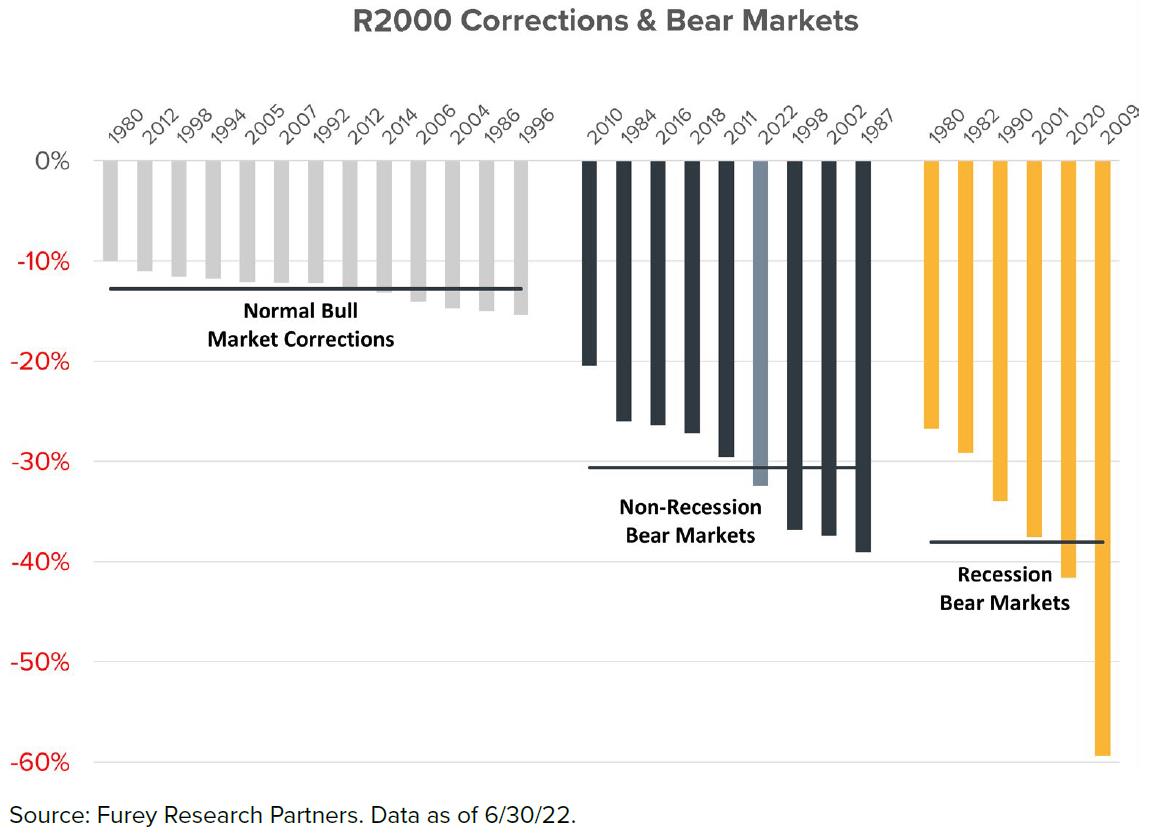
Things can always get worse, but we think it is a fool's errand to call market bottoms. The more helpful approach to navigating these markets and small caps, in particular, might be asking, "are we closer to a real opportunity, or are we a ways off?" We believe we are approaching a generational opportunity for small-cap investors.
Investors must avoid getting too pessimistic at this point in the cycle. Sentiment figures are at a level consistent with market bottoms in the past. The American Association of Individual Investors' (AAII) survey for the last two weeks showed that over 60% of investors are bearish. This is approaching record levels of pessimism which we use as a contrarian indicator.
IC: While the bear market has improved S&P 500 valuations, the index's P/E remains above the average for past bear markets. Are valuations among small-cap companies currently more attractive than those of their large-and mid-cap counterparts?
HP: The chart below shows small caps being the cheapest they have been relative to large caps in over 20 years. This may be because small caps are cheap or because large companies are expensive. Time will tell. What history tells us is that if you invested in smaller companies at the turn of the century when small caps were at similar levels of cheapness, the next decade was far more rewarding for you than indexing to the S&P 500.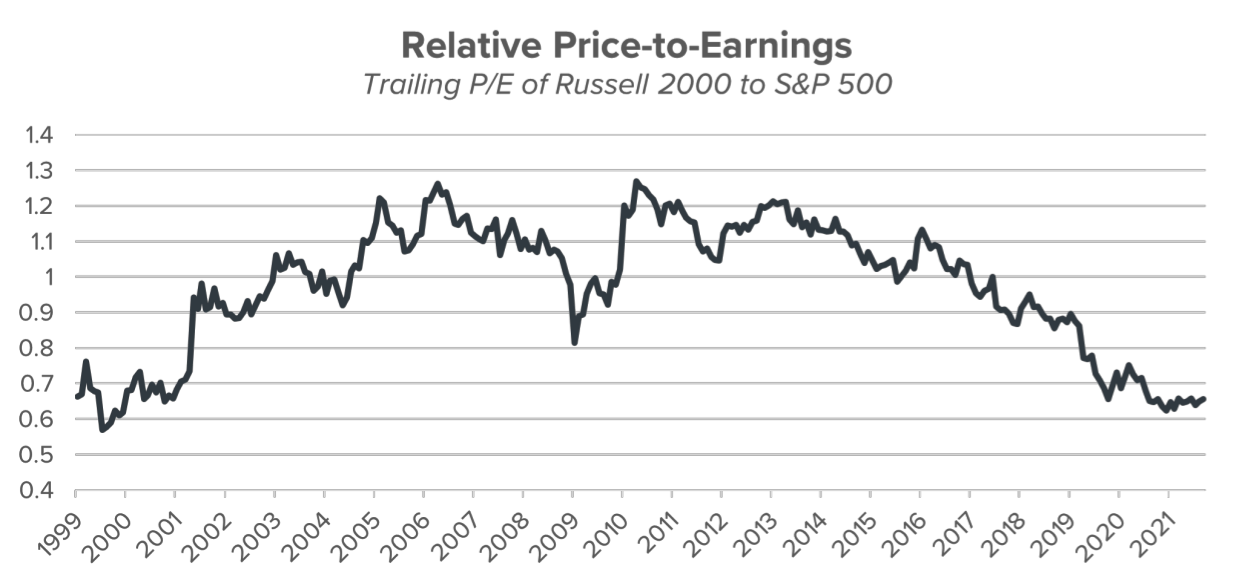
Source: Bloomberg
IC: Small caps have underperformed large caps over the last decade by a reasonable percentage (3.6% yearly). Can a new monetary cycle change that?
HP: It's possible. When the U.S. experienced stagflation, where prices continued to rise in the face of a slowing economy, from 1974 to 1982, small caps outperformed materially. These conditions haven't visited our economy since the mid to late 70s, so it's difficult to say how many investors are anticipating this.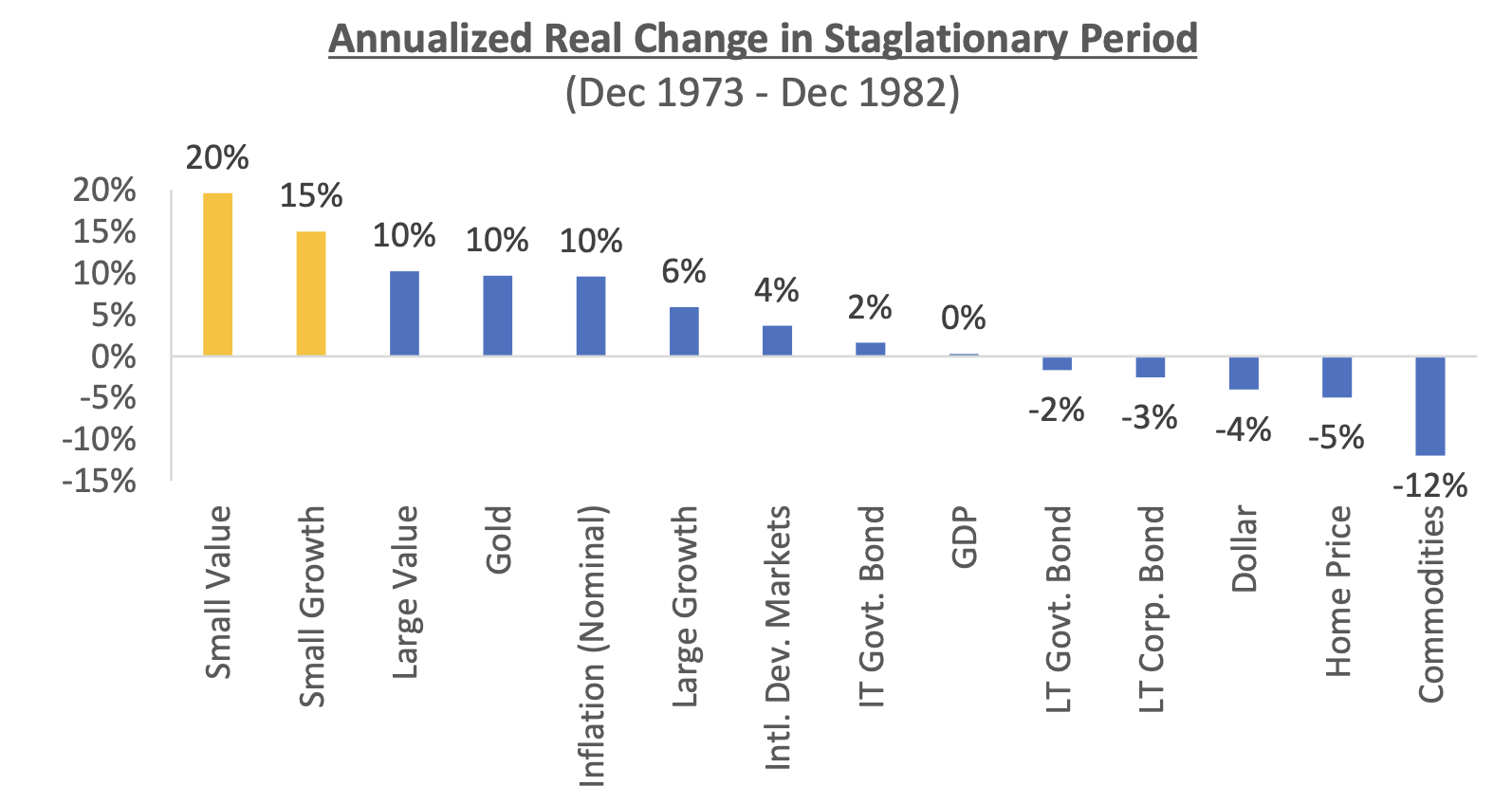
Source: Furey Research Partners
In addition, looking beyond the last decade, small caps have outperformed large caps historically.
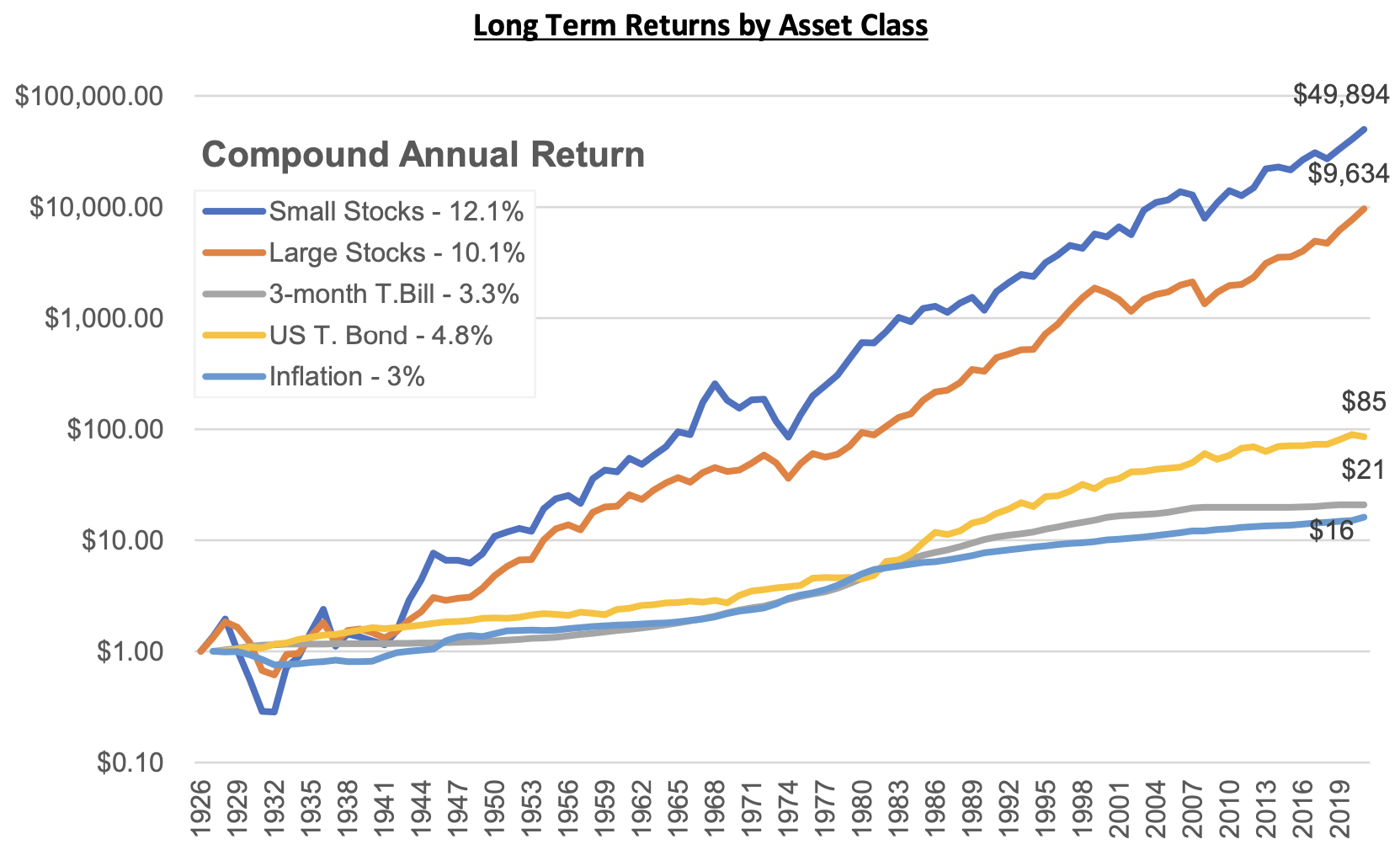
Source: Punch & Associates, Kenneth R. French Data Library, NYU Stern “Historical Returns on Stocks, Bonds and Bills: 1928-2021”
IC: To quote from a recent publication from Punch & Associates, what are the remaining reasons to own small-cap stocks in the current risk-off environment?
HP: The market is not going to be at risk-off forever, and the best time to buy is when it is. In addition, the relative valuation between large and small-cap companies is reaching record trough levels that should favor small caps in the future. 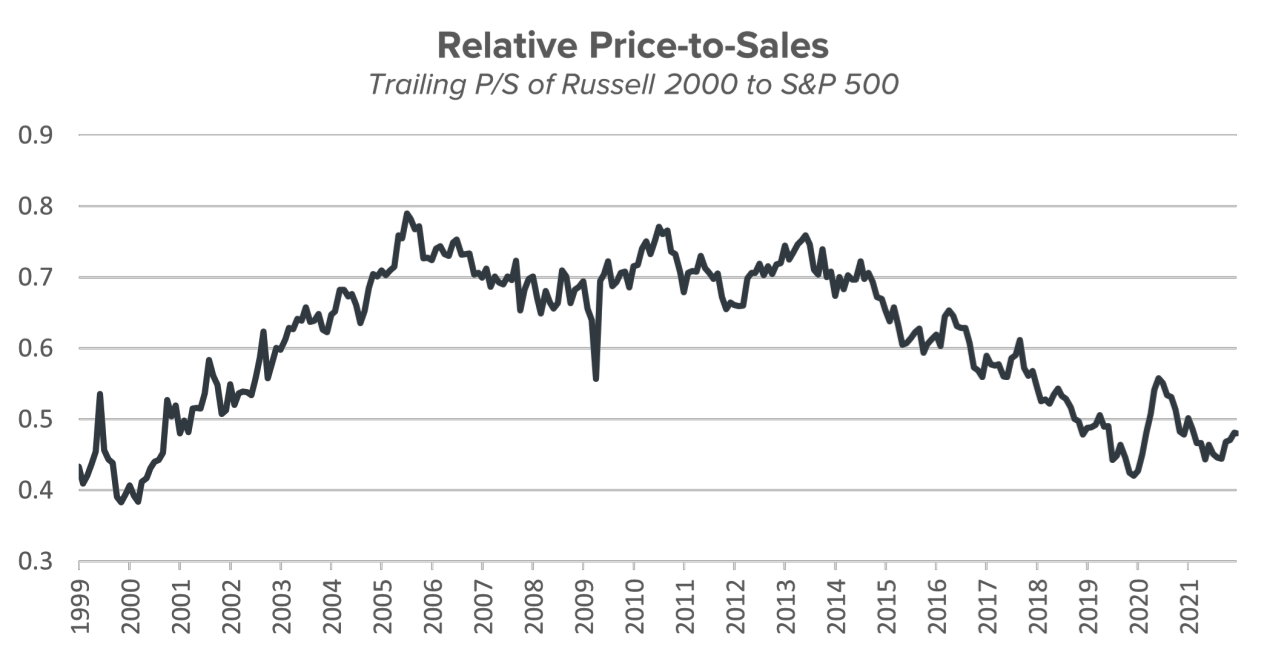
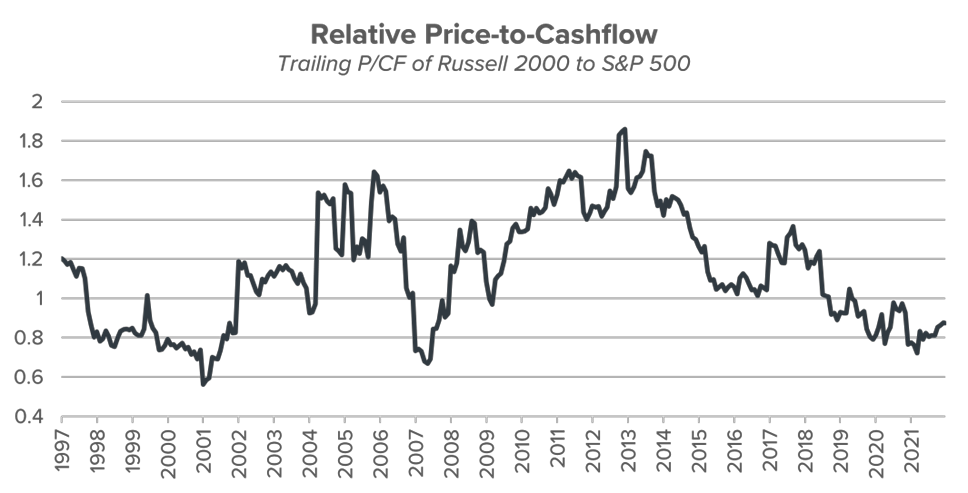
Source: Bloomberg
IC: 2021 was an excellent year for the general stock market but not a particularly good one for stock picking, as three-quarters of stock pickers underperformed the S&P 500. Does the current bear market mark a return to an environment where choosing the right companies to invest in is the best path to success?
HP: For Punch & Associates, 2021 was one of our better "stock-picking" years in our 20-year history. We avoided some of the speculative "air pockets" and benefited from a cycle that appreciated cheaper profitable companies.
2022 has been difficult for all diversified approaches in small caps. Some of the worries dealt with during the pandemic, like supply chains, are being replaced with new, more pervasive worries, such as broad-based inflation, rising energy costs, interest rates, and a mid-term election cycle.
We believe that in an uncertain, higher-cost-of-capital environment, investing in profitable companies with lower leverage and long runways to reinvest capital will lead to a better reward than a scattershot approach to investing in an index or asset class.
IC: Do small-cap companies suffer more or less from a stronger U.S. dollar, higher interest-rate environment than mid-and large-caps?
HP: According to Russell, 40% of the larger Russell 1000 companies' revenue comes from non-US sources. This compares to just 18% for Russell 2000 companies. Many companies in the Russell 2000 Index derive none of their revenue from overseas. The strong dollar is, of course, less of a concern for domestically focused businesses.
A higher interest-rate environment will likely result in a favorable scenario for profitable companies without too much debt on the balance sheet, regardless of business size. Unprofitable companies are more common in small caps, which underscores the importance of individual stock selection for investors interested in the asset class.
IC: In your opinion, what's the ideal weight for small caps in a stock portfolio? And what's the correct way to insert them?
HP: The ideal weight for small-cap in a portfolio is largely dependent on the risk tolerance of an investor and their time horizon. For long-term investors, we often see small-cap allocations of 15 to 30% of a diversified portfolio. For more conservative investors, small-cap stocks may be a smaller weight or even be excluded entirely for a risk-averse investor.
For investors with the time horizon to allocate to equity markets, historical data makes a case for being overweight in small-cap stocks relative to large-cap stocks. As the chart in question 4 showed, small-cap stocks have offered a return premium relative to large-cap stocks over the long run, although this has not been the case in the last decade, as we pointed out in our recent research piece.
Beyond the asset class return premium, the small-cap landscape is a much more favorable environment for active managers than large-cap managers. We see significantly less analyst coverage (6 analysts for the average Russell 2000 company; 21 analysts for the S&P 500 company) for the asset class. For investors like us that are willing to do the work, there are ample opportunities for active management to add incremental returns above and beyond that of the asset class.
IC: With that in mind, are there specific companies you think may succeed in the current complex macroeconomic environment?
HP: Simple companies may be the best answer to the complexity you reference. "There are riches in niches," as the saying goes. We enjoy identifying profitable smaller companies because many of them have simple business models, and their success may not depend on getting large macro factors right.
***
Disclosure: Punch & Associates is registered as an investment adviser with the U.S. Securities and Exchange Commission. Registration as an investment adviser does not imply a certain level of skill or training. Past performance does not guarantee and is not indicative of future results. All investments in the market are subject to a risk of loss. Some information may have been provided by or compiled based on information provided by third-party sources. Although Punch & Associates believes the sources are reliable, it has not independently verified any such information and makes no representations or warranties as to the accuracy, timeliness, or completeness of such information.
